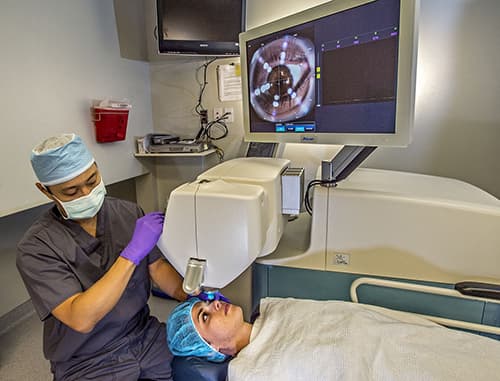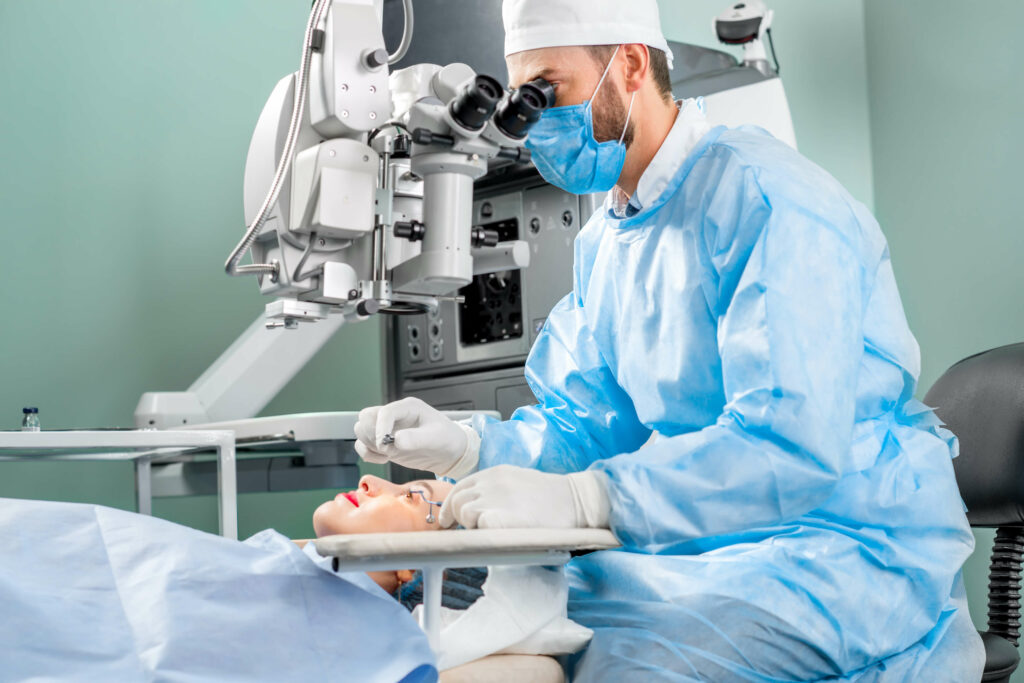At Evergreen Eye Center, our skilled cataract surgeons use advanced technology to produce the best vision outcome after cataract surgery. In addition to this, we also offer dropless cataract surgery to make the recovery process easier for you.
Learn About Your Cataract Surgery Options
What Happens Before Cataract Surgery?
Before embarking on cataract surgery, you will need a comprehensive eye exam. During this exam, your eye doctor will examine the overall health of your eyes and identify any risk factors before your surgery.
The data collected during this evaluation tell your eye doctor the length of your eyes and curvature in your cornea. These measurements will determine the amount of nearsightedness, farsightedness, or astigmatism in your eyes.
This exam will help your cataract surgeon select the proper intraocular lens to replace your cloudy lens. Choosing the accurate artificial lens power will give you the best possible vision after surgery.
Your eye doctor will want to ensure that conditions such as diabetes, high blood pressure, or heart disease are under control before surgery. Be sure to tell your doctor about any medications you are taking, particularly anti-clotting drugs or aspirin.
What Can I Expect During Cataract Surgery?

Cataract surgery takes twenty to thirty minutes to complete and is an outpatient procedure. Your eye doctor will require someone to drive you home after the procedure and to a follow-up appointment the next day.
If you have cataracts in both eyes, your eye doctor will operate on one eye first and then the second eye on another date after your first eye has healed. First, your eye doctor will numb your eye with eye drops.
Then they will create a small opening in the round dome at the front of the eye known as the cornea. After, your cataract surgeon will break up your natural lens where the cataract is and remove it.
Then, they will insert the new artificial lens in its place. Your cataract surgeon will then ensure the proper orientation and placement of the lens.
After this, the procedure is done. The small opening on the cornea will heal naturally, and you will be able to go home the same day.
Most people notice an improvement in their vision in the first few days after the procedure. Depending on the intraocular replacement lens chosen, you may still need to wear glasses after the operation.
What Can I Do to Ensure Successful Cataract Surgery?
You can take a few easy steps to ensure a successful outcome for cataract surgery. These steps will help minimize complications after surgery and speed up your healing time.
After cataract surgery, it is important that you protect your eye by wearing the bandage or eye shield given by your eye doctor to allow your eye to heal. This shield will keep you from accidentally rubbing your eye.
You will also need to use the eye drops given to you as directed. These drops will help prevent eye infections and ensure proper healing.
You may feel well enough to resume your daily activities, but it is important not to overdo it, especially in the week after surgery. Try to avoid bending, lifting, or intense physical activity until your doctor says it’s okay.
It is also important to go to your follow-up appointments, even if you feel fine and your vision is doing well. Your eye doctor will need to check the eye to ensure it is healing correctly.
Other steps that can help eyes heal after the procedure include staying out of pools and avoiding getting water in your eye. If you are sensitive to light, wear sunglasses in bright lighting to help.
It is also essential to know when to call your eye doctor. It is normal to have some blurry vision after surgery, but that should resolve a few days after the procedure.
Call your eye doctor right away if your vision worsens or you are experiencing increased eye pain, discharge, flashes of light, or swelling t
What Happens After Cataract Surgery?
Each year, millions of people worldwide get cataract surgery. It is a safe and effective procedure to remove the cloudy natural lens from the eye and replace it with an intraocular lens to restore vision.
Most people are required to use prescription eye drops after the procedure to avoid inflammation and other complications. You must administer the drops several times a day at specific times for them to be effective.
This requirement can add stress and anxiety when you are recovering. Another drawback to this system is having to pay for these prescription eye drops.
In traditional cataract surgery, these eye drops are necessary to promote healing, and it is essential to follow the regiment precisely.
This critical process can be challenging for those who find it hard to instill drops themselves or have trouble remembering to take the drops.
What Is Dropless Cataract Surgery?

Because experts continue to make new breakthroughs in the field of cataract surgery, there is another option that can reduce or eliminate your need for drops after cataract surgery. The cataract surgeons at Evergreen Eye Center are proud to be able to offer this option.
This new innovation in cataract surgery is called dropless cataract surgery, which eliminates the need to spend hundreds of dollars on prescription eye drops and administer them daily after surgery. Dropless cataract surgery allows your cataract surgeon to administer the antibiotic and anti-inflammatory medication directly into the eye during surgery.
This process gives you the same protection as the eye drops would. However, it eliminates the stress and additional burden of administering eye drops after surgery.
Dropless cataract surgery can significantly reduce the risk of post-surgery complications, and you will not have to worry about following a strict drop regimen after the procedure.
How Does Cataract Surgery Work?
During dropless cataract surgery and after the new lens has been placed, your cataract surgeon will insert anti-inflammation and antibiotic medicine directly into the eye. After the medication has been instilled, it will deliver a combination of antibiotics and corticosteroids into the eye.
This medication will be slowly released over the first few weeks after the procedure to promote healing. Some people may not be candidates for dropless cataract surgery.
For those with diabetes or other complicating factors, eye doctors may require a more extended period of using eye drops post-surgery. However, the bulk of the medication needed to prevent infection will already have been administered during surgery.
This process shifts the burden away from you.
What Are the Benefits of Dropless Cataract Surgery?
One benefit to this technique is that it is cheaper. Even with medical insurance, those who undergo traditional cataract surgery often have to pay for a portion of the cost of the drops needed after the procedure.
Dropless cataract surgery can save you money since this cost will likely be mostly eliminated. When finances are a concern, people may try to stretch their drops to avoid refills.
If you do not use the correct amount of drops with each dose, your eyes will not receive adequate protection, possibly resulting in complications. Because the medication is administered directly into the eye during the surgery, another benefit is the lowered risk of post-surgery infection and swelling.

Dropless cataract surgery significantly reduces your risk of complications after the procedure and is a convenient alternative to traditional cataract surgery. Another advantage is that you will not need to worry about using eye drops consistently after surgery.
Many people do not feel comfortable using eye drops or feel confident they can administer them correctly. Although dropless cataract surgery significantly decreases the need for eye drops after surgery, your cataract surgeon may still recommend using eye drops in smaller amounts.
Even though you may still need some eye drops, compliance will be easier because the requirements are still not as burdensome. Instilling daily medicated eye drops for seniors and or the elderly can be confusing, stressful, or challenging.
The need for eye drops after cataract surgery can be additional stress on caregivers and family members. This can be especially true for a post-surgical patient who is not physically or mentally capable of doing it themselves.
With dropless cataract surgery, the need for most eye drops for those who are elderly is eliminated, so the experience does not add additional responsibilities for senior caregivers.
How Do I Know If I am a Candidate for Dropless Cataract Surgery?
Most people respond well to dropless cataract surgery and will enjoy the benefits of not having to purchase and administer eye drops for weeks after surgery. However, it is essential to check with medical insurance providers before surgery to determine if the dropless cataract surgery procedure will be covered.
If it is not covered, you can make payment arrangements with Evergreen Eye Care. The first step to finding out if you are a good candidate for the safe and effective option of dropless cataract surgery is to make an appointment with your eye doctor.
Your eye doctor will determine if this procedure is a good option for you during this evaluation based on your medical history and other factors. Any person experiencing the signs or symptoms of cataracts should not hesitate to visit an eye doctor to get a definitive diagnosis and determine if it is time for cataract surgery.
Do you want to learn more about how the dropless cataract surgery process works? Schedule an appointment at Evergreen Eye Center today!

